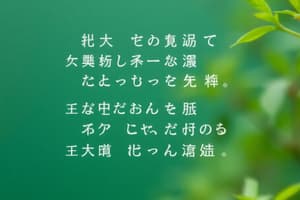Podcast
Questions and Answers
「私は友達のために料理を作ってあげました」という文は何を強調していますか。
「私は友達のために料理を作ってあげました」という文は何を強調していますか。
- 料理を作る技巧
- 料理の量
- 友達のために行った行為 (correct)
- 作った料理の味
「私は10時から仕事を始めます」という文は何を強調していますか。
「私は10時から仕事を始めます」という文は何を強調していますか。
- 仕事の開始時刻 (correct)
- 仕事の難しさ
- 仕事の長さ
- 仕事の内容
「私は宿題をやってしまった」という文は何を強調していますか。
「私は宿題をやってしまった」という文は何を強調していますか。
- 宿題の長さ
- 宿題の難しさ
- 宿題の完成 (correct)
- 宿題の内容
「私はコンサートを見に行きました」という文は何を強調していますか。
「私はコンサートを見に行きました」という文は何を強調していますか。
「私は店に行って買い物をします」という文は何を強調していますか。
「私は店に行って買い物をします」という文は何を強調していますか。
「私はパリに行って来ましたものです」という文は何を強調していますか。
「私はパリに行って来ましたものです」という文は何を強調していますか。
Flashcards are hidden until you start studying
Study Notes
Advanced Sentence Patterns
~てFORM + ものです
- Used to describe a past experience or action that has a connection to the present
- Emphasizes the result or consequence of the action
- Example: 「私はパリに行って来ましたものです」(I went to Paris and came back)
~てFORM + あげる/もらう/ くれる
- Used to describe an action that is done for the benefit of someone else
- Emphasizes the recipient of the action
- Example: 「私は友達のために料理を作ってあげました」(I cooked a meal for my friend)
~てFORM + はじまる/おわる
- Used to describe the beginning or end of an action
- Emphasizes the starting or finishing point of the action
- Example: 「私は10時から仕事を始めます」(I start working at 10 am)
~てFORM + しまう
- Used to describe an action that is completed or finished
- Emphasizes the completion of the action
- Example: 「私は宿題をやってしまった」(I finished my homework)
~てFORM + みる/きく
- Used to describe an action that is observed or experienced
- Emphasizes the observer's perspective
- Example: 「私はコンサートを見に行きました」(I went to watch a concert)
~てFORM + に行く/くる
- Used to describe an action that is done with a specific purpose or destination
- Emphasizes the direction or goal of the action
- Example: 「私は店に行って買い物をします」(I'm going to the store to buy something)
###vanced Sentence Patterns
~てFORM + ものです
- 過去の経験や行動が現在に影響を及ぼす場合に使用
- 行動の結果や影響に焦点を当てる
- 例:「私はパリに行って来ましたものです」(パリに行った経験が現在に影響を及ぼす)
~てFORM + あげる/もらう/くれる
- 他人のために行う行為を記述
- 行動の受益者に焦点を当てる
- 例:「私は友達のために料理を作ってあげました」(友達のために料理を作った)
~てFORM + はじまる/おわる
- 行動の開始や終了点を記述
- 行動の始まりや終わりを強調
- 例:「私は10時から仕事を始めます」(10時が仕事の始まり")
~てFORM + しまう
- 行動を完了した場合に使用
- 行動の完了を強調
- 例:「私は宿題をやってしまった」(宿題を完了した)
~てFORM + みる/きく
- 観察や体験した行為を記述
- 観察者の視点を強調
- 例:「私はコンサートを見に行きました」(コンサートを観た)
~てFORM + に行く/くる
- 目的や目的地を持って行う行為を記述
- 行動の目的や方向を強調
- 例:「私は店に行って買い物をします」(店に買い物をする目的を持って行く)
Studying That Suits You
Use AI to generate personalized quizzes and flashcards to suit your learning preferences.




